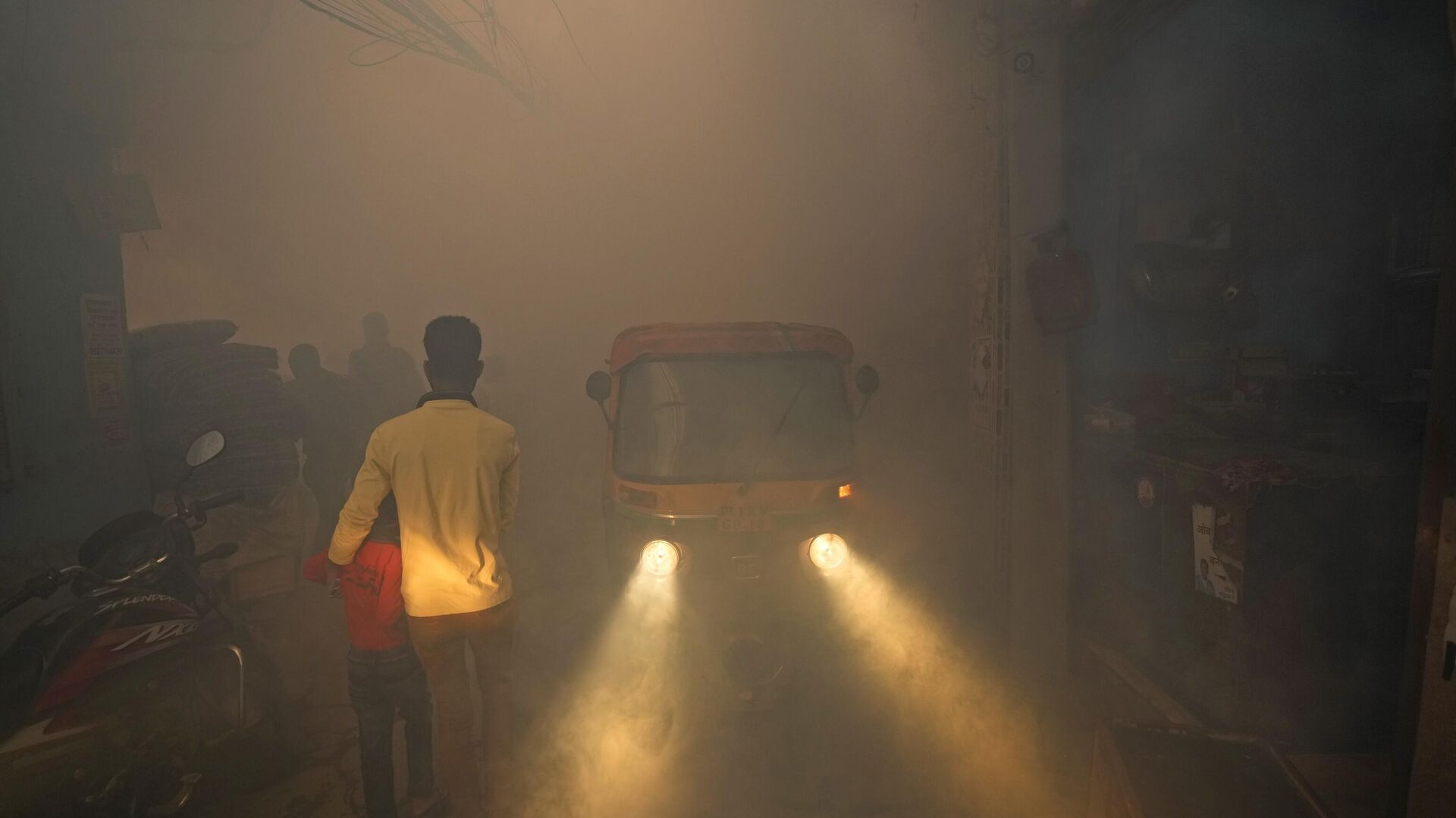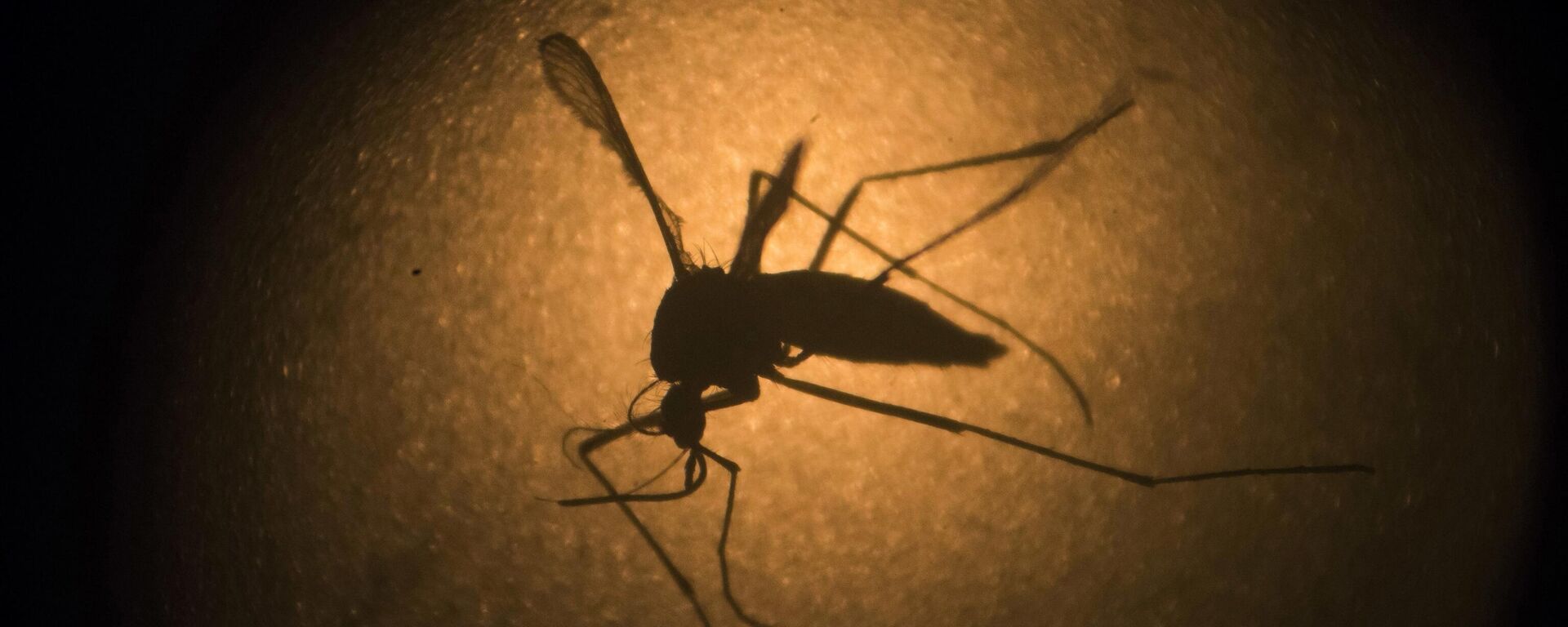https://sputniknews.in/20230516/as-dengue-virus-spreads-across-india-expert-provides-advice--1986687.html
As Dengue Virus Spreads Across India, Expert Provides Advice
As Dengue Virus Spreads Across India, Expert Provides Advice
Sputnik India
Dengue remains one of India's serious challenges, with 63,280 cases of the vector-borne virus till 30 September 2022 having been recorded, and at least 40,000... 16.05.2023, Sputnik India
2023-05-16T17:34+0530
2023-05-16T17:34+0530
2023-05-16T17:34+0530
india
dengue fever
health crisis
health
southeast asia
mosquitos
mosquito-borne diseases
https://cdn1.img.sputniknews.in/img/07e7/05/10/1996045_0:157:3083:1891_1920x0_80_0_0_eb5dfc3a1a49d2cbcb6dcedb4c81e10e.jpg
Every year, after the rainy season (July –August), India witnesses a rise in cases of Dengue, which affects humans when they are bitten by two types of mosquitoes - the Aedes aegypti and Aedes albopictus. According to the Lancet, in its global annual countdown on the health impacts of climate change, this accounts for a 1.69-percent increase between 1951-1960 and 2012-2021. The months of dengue transmission by Aedes aegypti mosquitoes have also risen to 5.6 months annually. A number of researches have shown that now mosquitoes are now able to breed through the year, with the primary culprit for this being climate change. Many research studies also claim that mosquitoes transmitting dengue and other viral diseases have started to develop resistance against insecticides in some parts of Asia.In India, before 2012-2013, Nagaland state, and Lakshadweep (Union Territory) used to report zero dengue cases. But in 2015, in a first, Nagaland had reported the vector-borne disease as did Lakshadweep in 2022. In 2022, only seven states and Union Territories reported less than 100 dengue cases, while none reported zero.Sputnik spoke with Dr. Monalisa Sahu, Consultant of Infectious Diseases at Yashoda Hospitals, Hyderabad to understand the expert view on the rise of dengue cases and what India can do to handle the crisis.Sputnik: What are the primary factors contributing to the recent surge in dengue cases?Dr Sahu: Heavy rainfalls causing increased breeding sites for mosquitoes and, poor vector control measures, poor use of personal protective measures from mosquito bites have caused the surge in dengue cases.Sputnik: How would you evaluate the preparedness and response of the Indian healthcare system in addressing the challenge?Dr Sahu: The preparedness and response of the Indian healthcare system can be evaluated by the various dengue control measures being taken by the Indian government through the NVBDCP (National Vector Borne Disease Control Programme) like vector control programmes and awareness campaigns being organized by them, prompt outbreak response and capacity building with training and strengthening and increased health care facilities to enhance the management of any such cases.Sputnik: Any specific regions within India experiencing a significantly higher number of dengue cases. Also, what are the factors behind it?Dr Sahu: States such as Delhi, West Bengal, Telangana, Uttarakhand, and parts of Uttar Pradesh have reported spikes in dengue cases in the past few weeks. The reason could be due to the climatic condition in these areas, with increased rainfall and increased breeding sites for the Aedes mosquito. Sputnik: What strategies or interventions should be prioritised to control and prevent the spread of Dengue?Dr Sahu: Continued surveillance of cases, adequate vector management by source reduction, chemical control measures, epidemic preparedness, training and strengthening human resources and research, inter-sectorial coordination, along with monitoring and supervision of the cases.Sputnik: Are there any challenges or limitations in implementing vector control measures, such as mosquito control and breeding site elimination, concerning India? How can these challenges be addressed?Dr Sahu: The challenges include rapid urbanization, increased breeding sites and lack of awareness about the various control measures. These can be addressed by various public awareness programmes and by improving the healthcare infrastructure.Sputnik: Can you discuss the role of climate change and environmental factors in India's increasing prevalence of Dengue? How can these factors be managed or mitigated?Dr Sahu: Heavy rainfalls and rapid urbanisation leading to increased breeding sites for mosquitoes are responsible for rising cases. These factors can be mitigated by adequate vector control measures and decreasing the breeding sites.Sputnik: What are the current diagnostic and treatment options available for dengue in India? Are there any advancements or research in progress to improve these options?Dr Sahu: Diagnostic tests include antigen testing (NS1 antigen), antibody testing (IgM and IgG), and molecular tests like Dengue PCR.Dengue doesn't come with a specific treatment. The best way to manage the disease is symptomatic treatment, getting enough rest, staying hydrated, seeking medical advice early, being informed about the warning signs, and being vigilant for them.Experts recommend painkillers for muscle aches and pills for reducing fever. However, they should be taken only under medical supervision and not be self-prescribed or be taken as over-the-counter medications.Sputnik: How does the socioeconomic status of individuals in India impact their vulnerability to dengue? What measures can be taken to address this disparity and ensure access to healthcare for all?Poor sanitation, waste and water disposal, lack of access to health care facilities, and rapid urbanisation contribute to an increase in the number of cases.Equitable distribution of resources, increasing public awareness, and making health care available for all can go a long way in ensuring access to health care.
https://sputniknews.in/20230111/asias-super-resistant-mutant-mosquitoes-trigger-alarm-456651.html
https://sputniknews.in/20221219/indian-doctors-open-up-about-silent-spreader-of-zika-vrius-144116.html
india
southeast asia
Sputnik India
feedback.hindi@sputniknews.com
+74956456601
MIA „Rossiya Segodnya“
2023
Deexa Khanduri
https://cdn1.img.sputniknews.in/img/07e6/0c/13/138923_52:0:533:481_100x100_80_0_0_cadf23d341691fc65ff2b22fd1afe584.jpg
Deexa Khanduri
https://cdn1.img.sputniknews.in/img/07e6/0c/13/138923_52:0:533:481_100x100_80_0_0_cadf23d341691fc65ff2b22fd1afe584.jpg
News
en_IN
Sputnik India
feedback.hindi@sputniknews.com
+74956456601
MIA „Rossiya Segodnya“
Sputnik India
feedback.hindi@sputniknews.com
+74956456601
MIA „Rossiya Segodnya“
Deexa Khanduri
https://cdn1.img.sputniknews.in/img/07e6/0c/13/138923_52:0:533:481_100x100_80_0_0_cadf23d341691fc65ff2b22fd1afe584.jpg
india, dengue fever, health crisis, health, southeast asia, mosquitos, mosquito-borne diseases
india, dengue fever, health crisis, health, southeast asia, mosquitos, mosquito-borne diseases
As Dengue Virus Spreads Across India, Expert Provides Advice
Deexa Khanduri
Sputnik correspondent
Dengue remains one of India's serious challenges, with 63,280 cases of the vector-borne virus till 30 September 2022 having been recorded, and at least 40,000 more (as per media reports) three months later. Cases of the illness have been reported in all states countrywide.
Every year, after the rainy season (July –August), India witnesses a rise in cases of Dengue, which affects humans when they are bitten by two types of mosquitoes - the Aedes aegypti and Aedes albopictus.
According to the Lancet, in its global annual countdown on the health impacts of climate change, this accounts for a 1.69-percent increase between 1951-1960 and 2012-2021. The months of dengue transmission by Aedes aegypti mosquitoes have also risen to 5.6 months annually.
A number of researches have shown that now mosquitoes are now able to breed through the year, with the primary culprit for this being climate change.
Many research studies also claim that mosquitoes transmitting dengue and other viral diseases have started to develop
resistance against insecticides in some parts of Asia.
In India, before 2012-2013, Nagaland state, and Lakshadweep (Union Territory) used to report zero dengue cases. But in 2015, in a first, Nagaland had reported the vector-borne disease as did Lakshadweep in 2022.
In 2022, only seven states and Union Territories reported less than 100 dengue cases, while none reported zero.
Sputnik spoke with Dr. Monalisa Sahu, Consultant of Infectious Diseases at Yashoda Hospitals, Hyderabad to understand the expert view on the rise of dengue cases and what India can do to handle the crisis.
Sputnik: What are the primary factors contributing to the recent surge in dengue cases?
Dr Sahu: Heavy rainfalls causing increased breeding sites for mosquitoes and, poor vector control measures, poor use of personal protective measures from mosquito bites have caused the surge in dengue cases.
Sputnik: How would you evaluate the preparedness and response of the Indian healthcare system in addressing the challenge?
Dr Sahu: The preparedness and response of the Indian healthcare system can be evaluated by the various dengue control measures being taken by the Indian government through the NVBDCP (National Vector Borne Disease Control Programme) like vector control programmes and awareness campaigns being organized by them, prompt outbreak response and capacity building with training and strengthening and increased health care facilities to enhance the management of any such cases.
Sputnik: Any specific regions within India experiencing a significantly higher number of dengue cases. Also, what are the factors behind it?
Dr Sahu: States such as Delhi, West Bengal, Telangana, Uttarakhand, and parts of Uttar Pradesh have reported spikes in dengue cases in the past few weeks. The reason could be due to the climatic condition in these areas, with increased rainfall and increased breeding sites for the Aedes mosquito.
Sputnik: What strategies or interventions should be prioritised to control and prevent the spread of Dengue?
Dr Sahu: Continued surveillance of cases, adequate vector management by source reduction, chemical control measures, epidemic preparedness, training and strengthening human resources and research, inter-sectorial coordination, along with monitoring and supervision of the cases.
Sputnik: Are there any challenges or limitations in implementing vector control measures, such as mosquito control and breeding site elimination, concerning India? How can these challenges be addressed?
Dr Sahu: The challenges include rapid urbanization, increased breeding sites and lack of awareness about the various control measures. These can be addressed by various public awareness programmes and by improving the healthcare infrastructure.
Sputnik: Can you discuss the role of climate change and environmental factors in India's increasing prevalence of Dengue? How can these factors be managed or mitigated?
Dr Sahu: Heavy rainfalls and rapid urbanisation leading to increased breeding sites for mosquitoes are responsible for rising cases. These factors can be mitigated by adequate vector control measures and decreasing the breeding sites.
Sputnik: What are the current diagnostic and treatment options available for dengue in India? Are there any advancements or research in progress to improve these options?
Dr Sahu: Diagnostic tests include antigen testing (NS1 antigen), antibody testing (IgM and IgG), and molecular tests like Dengue PCR.
Dengue doesn't come with a specific treatment. The best way to manage the disease is symptomatic treatment, getting enough rest, staying hydrated, seeking medical advice early, being informed about the warning signs, and being vigilant for them.
Experts recommend painkillers for muscle aches and pills for reducing fever. However, they should be taken only under medical supervision and not be self-prescribed or be taken as over-the-counter medications.
Sputnik: How does the socioeconomic status of individuals in India impact their vulnerability to dengue? What measures can be taken to address this disparity and ensure access to healthcare for all?
Poor sanitation, waste and water disposal, lack of access to health care facilities, and rapid urbanisation contribute to an increase in the number of cases.
Equitable distribution of resources, increasing public awareness, and making health care available for all can go a long way in ensuring access to health care.




